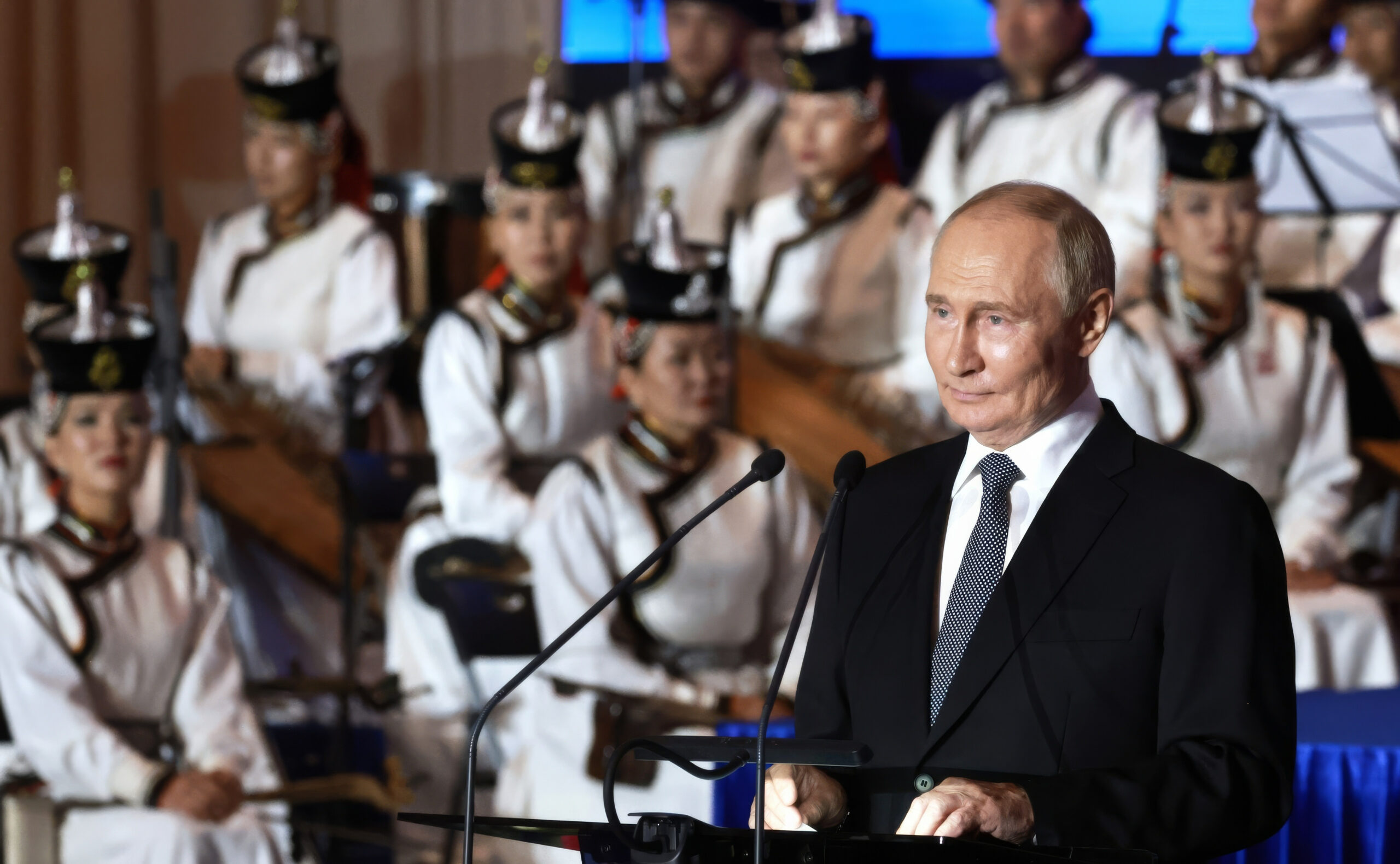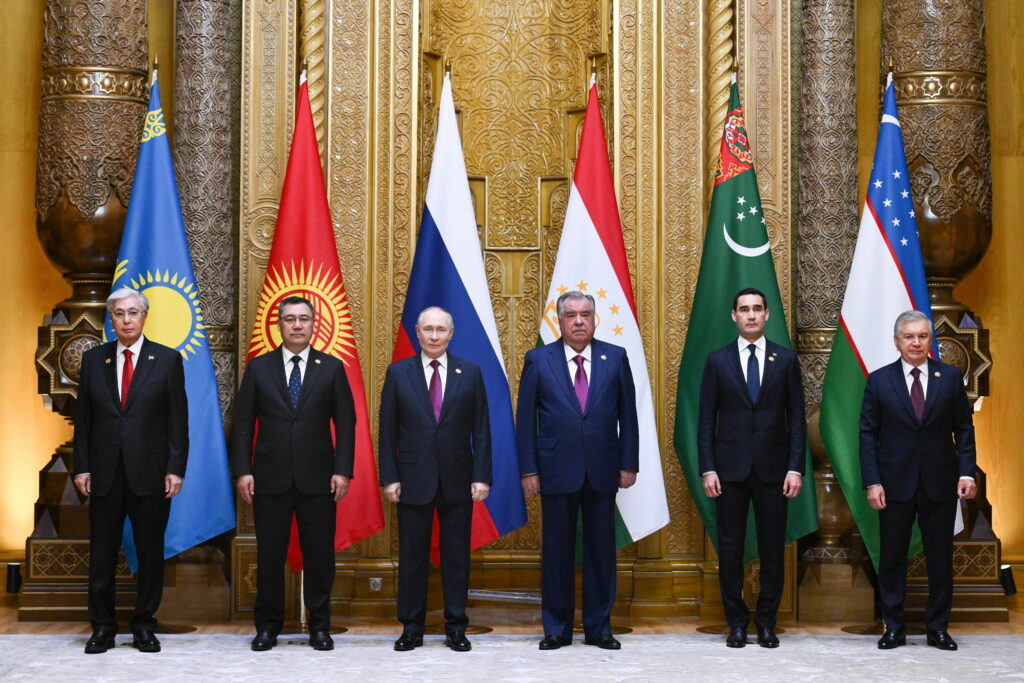This September Vladimir Putin flew to Mongolia for an official visit. Initially, the trip sparked speculation: Mongolia is an International Criminal Court member and the ICC has a warrant for Putin’s arrest. Accordingly, Ukraine requested Mongolia to detain the Russian president. Yet Putin’s trip went ahead without handcuffs or jail cells. Realistically, if there had even been a tiny chance that Mongolia would actually arrest Putin, the Russian president would have stayed home. For Moscow, pulling off this visit carried a symbolic and defiant set of messages: international institutions are «declining»; the Russian leader is not pushed into isolation; and Moscow is active in setting up a new framework that is supposed to usher in a fairer «multipolar world».
Showing off in Ulaanbataar
In Mongolia, Putin spoke of WWII, economic cooperation and invited Mongolia to play a more active role in the BRICS+ format. He showcased the image Russia wants to project, one where despite sanctions and war, Moscow is active in engaging the Global South, offering cooperation and promise of a new international institutions that would be designed to be more inclusive than those of the West. Moscow is determined to come up with new institutions that would help bypass western sanctions.
Russia’s challenge is quite clear: it needs to create an alternative infrastructure for trade and finance in order to continue international trade without major losses. Moscow believes that new non-Western instruments will be attractive to the «global majority». First of all, we are talking about alternatives to American-centric payment systems and interbank information transfer systems. Russia is currently implementing the most advanced project in this regard with Iran: in July of this year, the parties announced the integration of national payment systems. Now, bilateral trade should be carried out using national currencies, which reduces the costs of for all parties. Moscow hopes that in the long term, the Western sanctions regime will change or, at a minimum, non-Western countries will more actively seek new opportunities to do business with Russia. The world will adapt and profitable commercial offers will «overcome the fear of secondary sanctions.» Such assumptions are based on understandable logic: there are many countries in the world that want to trade and cooperate with the Kremlin. Neither sanctions nor war cancel the desire to make a significant profit. Moscow may reasonably argue that even Ukraine’s supporters in the EU have not lost their sympathy for Russian exports. Contrary to the spirit of public statements, the EU is buying record volumes of Russian oil from India, importing more Russian gas than gas from the US, and private Western companies continue to supply dual-use and military goods to Russia.
According to Putin’s statement, Russia, despite the war and Western sanctions, has risen to fourth place among the world’s largest economies in terms of purchasing power parity. In the logic of such a picture of the world, Putin’s trip to Mongolia seems entirely justified. In this way, he is demonstrating to the world that Russia is «winning» and is happy to cooperate with all those who are ready for a new world order.
Russia is quite capable of projecting an image of steadfastness and even some success to those countries of the world that, for their own reasons, have grievances against the West and are not particularly concerned about the war in Ukraine. However, upon closer examination of Russia’s position, assessments of the current context look completely different.
Russia’s friends?
In June, the Russian president traveled to North Korea and received a caricature of a dictatorial reception there. Putin is the only leader of Russia and the USSR to go to the DPRK on an official visit. For most of the 75 years of relations with the DPRK, Moscow perceived it as a client or satellite state. Before Putin’s visit, no one expected that the Russian leader would pretend that Russia and the DPRK were states of the same level. In Pyongyang, Putin and Kim Jong-un signed an agreement on strategic partnership, according to which Russia would have to come to the aid of the DPRK in the event of external aggression.
The question arises: why does Moscow need this? The simple answer is that it is forced to take such measures. The DPRK is the only country in the world that fully supports the goals of the Russian war in Ukraine. Against this background, Pyongyang has become a key partner for Russia in the export of shells that the Russian army fires daily at Ukrainian territory. Pyongyang has already supplied Moscow with five million shells and has committed to continue exporting them in the future. It should be noted that the volume of supplies from the DPRK exceeds any other military imports by orders of magnitude. For example, the total number of drones delivered from Iran to Russia is estimated at a thousand units. At the same time, the DPRK has capacity to increase military production, which makes it a key link in the war of attrition unleashed by Russia against Ukraine.
However, the prospects for economic cooperation with the DPRK are unlikely to seriously impress anyone. After a ninefold increase in 2023, the countries’ trade turnover amounted to just over $ 30 million, which is equivalent to Russia’s pre-war trade volume with Barbados.
Another key partner of Russia is Iran. These countries have a lot in common: for example, the experience of living under Western sanctions. Tehran is a key supplier of drones and ballistic missiles for Moscow. Moscow is making significant efforts to deepen trade and financial ties with Iran, but a number of factors are preventing a serious breakthrough. For example, the increase in trade turnover, which currently amounts to about $ 4 billion, is hampered by logistics: the low throughput of Caspian ports and the need for significant investment in land route infrastructure.
Loud statements about the emergence of a «Russia-Iran-North Korea» axis seem unfounded. Moscow’s increased interest in rogue states is explained by the needs of war, and civilian trade has only a small potential for growth. These countries agree that US hegemony is bad, but otherwise they have very different political contexts. And in each case there is significant potential for escalation of risks. Moscow would like the DPRK not to provoke its neighbors too much, so it is unlikely to agree to supply Pyongyang with technologies that could radically change the security configuration on the Korean peninsula.
Russia’s neighbors and partners in the Eurasian Economic Union (EAEU), as well as its allies in the CSTO, are clearly not thrilled with the ongoing war in Ukraine. With the exception of Belarus (which, incidentally, had no choice), no one supported Russia’s actions in Ukraine. At the same time, Armenia has de facto ceased cooperation with the CSTO and is openly seeking an alternative to partnership with Russia. Future relations between Moscow and Yerevan will clearly not be simple — not least because Moscow is actively developing a partnership with Azerbaijan, investing in long-term infrastructure projects.
In Central Asia, Moscow is gradually having to acknowledge China’s increased role in the political, economic and even military spheres. After the April terrorist attack in Moscow, the Russian authorities took a number of measures that significantly impact one of the most important areas of cooperation with the region — labor migration. The only positive dynamics in relations between Russia and the countries of the region is currently the increased trade against the backdrop of growing parallel imports and a considerable number of collaborations to circumvent sanctions.
In the same vein, the war created opportunities for increasing cooperation between Russia and Georgia. Already in 2022, Moscow became Tbilisi’s second largest economic partner. Given the difficult context of Russian-Georgian relations, Georgia’s willingness to participate in parallel imports to the Russian Federation only reinforces Moscow’s belief that profit is often more important than political guidelines. But one cannot help but notice that Russia’s role in the Caucasus and Central Asia after 2022 is becoming less pronounced. Moscow is forced to accept the new realities of the region in order to preserve critically important supplies of parallel imports.
At the same time, the EAEU, which was conceived as «its own version of the EU» and was supposed to tie Russia’s neighbors to Moscow, collapsed, and the Russian war in Ukraine only accelerated the desire of the countries of the region to develop a multi-vector foreign policy.
India’s position, thanks to which Russian oil now enters the EU, diverges from Russia on most important political issues. This concerns the approach to the war in Ukraine, the future of regional trade and integration projects, and the security architecture in the Pacific region. The overall dynamics of relations with India in recent years has forced Russian internationalists to ask the question: «Is Russia losing India?» Indeed, if we remove the mutually beneficial trade in hydrocarbons, Moscow and New Delhi will not have many points of contact left.
Chinese wariness
Finally, let us turn to Russia’s most important partner — China. Over the past decades, Moscow has had different ideas about what its «Pivot to China» would look like. In 2014, the main idea was economic: Moscow expected Beijing to become the largest partner in developing the Far East. Then, together with China, it planned to become the main supplier of economic growth and security in Eurasia. But in the end, Russia began to admit that China has little interest in its foreign policy concepts. And after February 2022, Moscow has had to come to terms with the idea that there is no alternative to China. Accordingly, it will be forced to accept what China offers.
Trade turnover between Russia and China now amounts to about $ 240 billion, which is equivalent to the figure between Russia and the EU before the war. Moscow is becoming increasingly dependent on Beijing, and the latter is openly taking advantage of this. Russia’s largest energy project, Power of Siberia 2, was supposed to guarantee the predictability of Russian exports, replace Europe, and tie China to Russia. But no matter how many times Putin flies to Beijing, China does not give him the green light to implement the project. Beijing also refused to supply equipment to Arctic LNG 2. In addition, Russian businesses are constantly facing problems paying for supplies from China, which is increasingly complying with secondary US sanctions. Thus, economic cooperation with China, which is so important for Moscow, is becoming less and less predictable. But Russia will have to accept increasingly unattractive rules of the game and increased costs, because the Kremlin has no alternative to China. Of course, this is not the entire list of Russian partners. Moscow has recently been relying on the UAE, which provides it with a whole range of financial services and parallel import options. Turkey still remains an important trading partner. In Africa, Moscow is trying to increase its presence, but we should not expect any major breakthroughs there. Russia’s main partner in the Balkans, Serbia, refuses to support Russia in forming a new international agenda.
It is not that Russia is isolated and Putin has become an outcast. Moscow has enough strength to create the appearance of an active foreign policy agenda, full of ideas and attractive economic deals. But on closer inspection, we see an increasingly complex picture of partnerships built on the needs of war and financial incentives.










